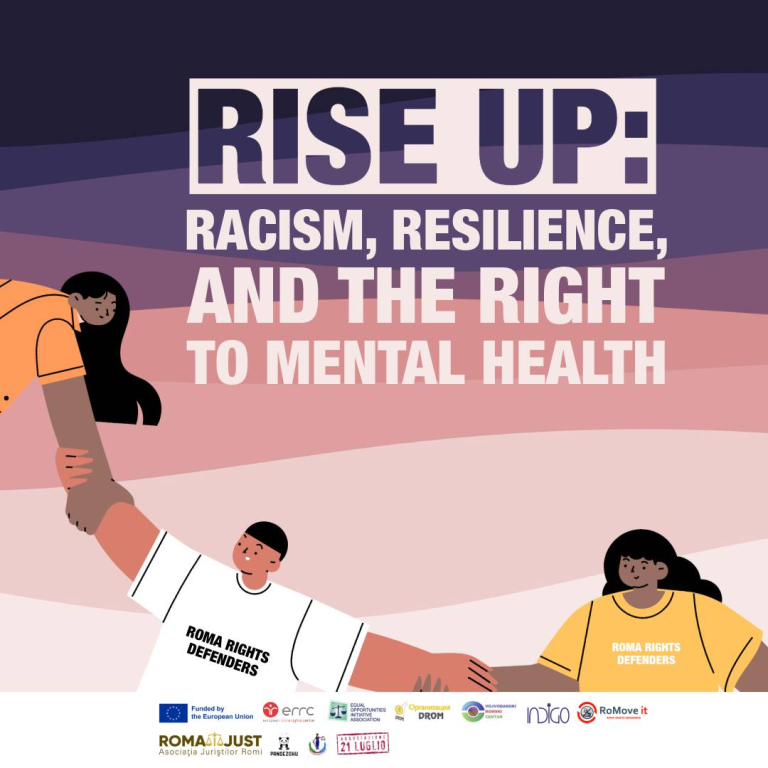New ERRC Report: Rise Up! Resilience and Solidarity in the Face of Anti-Roma Racism
26 November 2025

The ERRC’s new report Rise Up is inspired by the actions of our Roma Rights Defenders, driven by the need to combat anti-Roma racism and hate speech, both online and in real life.
In their own words, RISE activists, volunteers and coordinators explained what inspires them, what keeps them keeping on, and why solidarity matters.
When it comes to combating online hate speech, the stakes have never been higher. There is much research and little doubt about the destructive toll that racism takes on young bodies; that chronic discrimination causes chronic stress, that racist experiences in childhood are particularly damaging, and the impact long-lasting in terms of health and wellbeing.
The prevalence of harmful and hateful online content poses a threat not just to the targeted individuals and communities, but a threat to the very foundations of democracy and human rights, in a world where the forces for good are forever playing catch-up.
In addition to charting the harms caused by racism in general and online hate speech in particular, this new ERRC report puts great emphasis on collective resistance and response – that vital sphere of activity where the personal becomes political in keeping hope alive – and how individual activists maintain the strength and stamina in pursuit of justice and equity.
As the interviews with RISE Roma rights defenders make clear, anti-racist resistance demands resilience, and solidarity is the glue that holds it all together. Their testimonies provide fascinating personal insights about from where they draw their strength and inspiration, and just how much solidarity matters, for as one activist and educator put it:
“Solidarity is essential. It’s about standing together, not just in words but through real actions and long-term commitment … My allies are both Roma and non-Roma individuals and organizations who actively support equality and justice. They are people who speak out against discrimination, amplify Roma voices, and work with us—not for us. Together, we are stronger and more capable of challenging hate and building a more inclusive society.”
The sense of shared experiences and common purpose across borders was considered a precious asset, both in terms of individual and collective coming-to-terms with the distress caused by online hate speech, and the task of devising concrete strategies of anti-racist resistance and response.
Resilience, understood at key moments for activists, as ‘the strength to continue’, is precisely where the personal and the political intersect. The testimonies of RISE activists transcended narrow individualist notions of resilience; making clear from where they draw their strengths, they placed great store in solidarity – from intimate circles of family and friends to wider constellations of comrades and allies – and fortifying stamina from the shared experiences in activism, campaigning and struggle.
For younger RISE volunteers, connecting with others mattered much when it came to carrying on, as one person explained: “What motivates me is having met people who also want societal change—I am not alone in this fight. Their support shows me that everything I do is not in vain.”
Among the most striking aspects that surfaced in the interviews with the RISE activists when asked about personal motivation and what drives and inspires them, was how seamless was the linkage between individual narratives and broader struggles against racism. The emphasis on connecting the personal to the political, and cultivating collective forms of resilience resonated strongly with many RISE activists such as Klaudia:
“My involvement in Roma rights activism began with my lived experience as a woman growing up in Albania, where I witnessed first-hand the structural discrimination, stereotypes, and social exclusion our community faces. What started as personal frustration turned into a sense of responsibility when I realised that staying silent meant accepting injustice as the norm.”
Common to the RISE participants is a motivation that is historically informed, grounded in present realities, and future-oriented in its aspirations. As Xhenson Çela explained,
“This drive is also fuelled by the conviction that the darkest chapters of our history, marked by stereotypes, prejudice, and systemic discrimination, must not be allowed to persist in the present, nor be carried into the future. The pursuit of a better tomorrow, one free from alienation and exclusion, is the force that fuels my activism and lifelong commitment to change.”
This publication is part of the EU-funded RISE project, in which an ERRC-led consortium brought Roma activists and volunteers together as Roma Rights Defenders, to foster transnational and inclusive approaches to combating anti-Roma racism. The full report, Rise Up: Racism, Resilience, and the Right to Mental Health, can be downloaded here.




